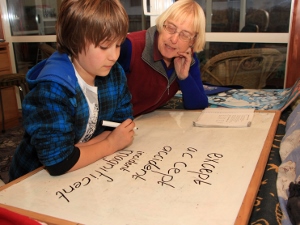
SPELD NZ, in collaboration with school RTLBs (Resource Teachers of Learning and Behaviour), carried out a pilot study involving 42 seven-year-old students struggling in the classroom as a result of dyslexia.
Dr Waldie analysed the resulting data and says she was taken by surprise.
“I knew that I would find that students would increase their reading skills after SPELD lessons. What I didn’t realise, however, was just how successful the pilot programme would be.
“The children increased their predicted reading success by 20-44 per cent in areas of sound blending, phonemic awareness, verbal comprehension and reading fluency. However. their general cognitive abilities also significantly improved. We saw vast improvements in thinking ability, cognitive fluency and processing speed. I am truly impressed.”
The New Zealand Journal of Educational Studies published the research findings, noting the improvement of cognitive efficiency and processing speed was “testament to the ability of the brain to be modified, presumably via strengthened neural connectivity, following even a relatively brief (60 session) exposure to an enriched environment in the form of SPELD intervention”.
The students in the study came from a variety of schools, ranging from decile 1 to decile 10. They received 60, 45-minute sessions of one-on-one tuition, twice weekly, from SPELD NZ teachers. Each child had assessments of their academic and cognitive abilities before and after the 60 lessons using the Woodcock-Johnson III (WJIII) test battery.
SPELD NZ’s chairperson Marion Fairbrass says although the sample size was small, it was a first step and the findings were very encouraging.
“They indicate that specialised teaching, built on solid foundations, can make a strong contribution to those with dyslexia and to the wider education sector.
“The pilot programme proves that by investing in our under-achieving seven-year-olds, we can help them achieve literacy and success at school. As dyslexia and other specific learning disorders can be hereditary, this could have a flow-on intergenerational effect. Can we afford NOT to help these children?”
The research findings will be used to develop and underpin similar studies planned for the future.
The much-delayed English draft curriculum is now out for consultation, generating discussion from teachers.
Research from AUT demonstrates arts, culture and recreation have positive impacts on all aspects of…
How effective has the school phone ban been in achieving its aims? Researchers from the…
School camps and excursions deliver hands on learning experiences, helping to consolidate classroom learning.
Innovations in AV technologies present new opportunities to engage with students. We look at how…
A new report from the University of Auckland’s Our Voices Project asks young people what…
This website uses cookies.